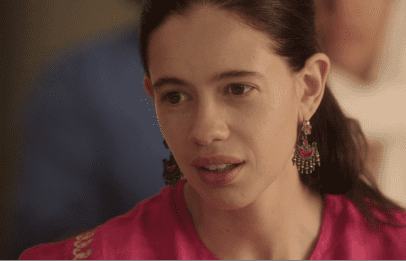
“I am naked in this film,” says director Shonali Bose.
It’s Bose’s unwavering commitment to vulnerability that makes her new film, Margarita, with a Straw, both tender and jubilant.
The film’s 19-year-old protagonist Laila (played by Kalki Koechlin, above) lives at home with two loving parents and an annoying little brother. She is mildly bored with school, writes lyrics for a band, and has an unrequited crush on the lead singer. But that’s where any resemblance to a John Hughes sleepover flick ends.
Laila has cerebral palsy and lives in India. A creative writing scholarship propels her across the globe to New York City where she discovers snow, central heating and her nascent sexuality.
The inspiration for Laila is Bose’s own cousin.
“Malini and I grew up together,” Bose says. “I took her cerebral palsy for granted, never letting it deter us from any activity. When I asked her what would be the best [birthday] present, she replied loudly and clearly, ‘I just want to have sex!’”
The chronicle of a disabled young woman’s sexual awakening — heterosexual awakening — might’ve been fodder enough for most filmmakers. But Bose’s readiness to mine her own life took her a step further.
“I’m bicontinental as well as bisexual,” she reveals. “In the first drafts of the script, Laila was straight . . . I don’t think I was conscious that I was retelling my own narrative. I was so deeply immersed in the skin of my protagonist that I felt she spoke to me when she said, ‘Hey, I like the cool gay girl — I want to be with her!’”
The result is Laila’s quickly conflicting affections for both Jared, a straight, blue-eyed blond Englishman, and Khunam, a blind, unapologetic Bangladeshi lesbian with activist tendencies.
But the greatest and saddest truth that runs though this story is one of Bose’s own suffering and loss.
In the early stages of story development, Bose’s eldest son died suddenly in an accident.
“Margarita obviously took a back seat. Then, four months later, on Ishan’s 17th birthday, I celebrated with as much joy as I would if he were alive. Because this was the day he entered my life. And nothing could change that. That night I was able to sit down and start writing the first draft of Margarita, with a Straw.”
Grief in the film is sometimes in the distance, sometimes front and centre. Like life.
“This film has captured all the pain, struggle, joy, peace and acceptance of this period in my life,” Bose says.
Her willingness to share these truths with such unfettered honesty offers us a film resonant with it all — pain, struggle, joy, peace and acceptance.
Margarita, with a Straw opens this year’s Women in Film Festival in Vancouver on Wednesday, March 4 at 7 pm at VIFF’s Vancity Theatre, 1181 Seymour St.

 Why you can trust Xtra
Why you can trust Xtra


